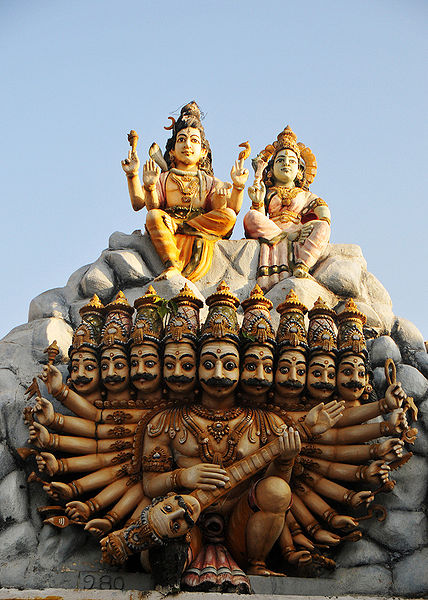Hanuman's Curse
Having received boons from the gods, Hanuman grew up to be a strong and fearless monkey. He was also mischievous! He would tease the sages of the forest, breaking their pots, tearing up their clothes and interfering with their sacrifices.
Finally the sages cursed Hanuman. "You will forget all your powers!" they shouted at him, and Hanuman no longer remembered the boons he had received.
It was not until he heard the words of King Jambavan years later, on the shore of the sea, that he remembered the supernatural abilities that allowed him to jump all the way to Lanka.
Notes. Jambavan reminds Hanuman of the story of his birth and great powers in Sarga 66 of the Kishkindha Kanda. Even today, mischievous Hanuman Langur monkeys cause all kinds of problems, especially in the cities like Delhi: Langurs of Delhi.
Hanuman and Surya
Young Hanuman sought wisdom. He learned all he could from books and wanted to learn more, so his parents sent him to Surya, the all-seeing Sun God.
Surya, however, remembered how baby Hanuman had once attacked him and refused. "I must travel all day; I don't have time to stop for lessons."
"I will run backwards, never stopping, so that I may learn from you," said Hanuman. So Surya became Hanuman's guru, and Hanuman's face was burned black.
After completing his studies, Hanuman wanted to give Surya a gift. "Look after my monkey son, Sugriva," said Surya, and Hanuman obeyed.
Notes. For the story of Hanuman's earlier attack on Surya, see The Birth of Hanuman. The gift that the pupil traditionally gives to the guru is called guru-dakshina.
Shiva and the Dancing Monkey
When the god Shiva heard that Vishnu had been born in human form, Shiva wanted to pay his respects. Shiva thus became a street performer, playing his drum while a monkey danced to the beat. Hanuman was that monkey.
The drummer performed for King Dasharatha and his family, and little Rama was enchanted by the dancing monkey. "Let me keep the monkey!" Rama pleaded, and so Hanuman became Rama's pet.
When Vishvamitra took young Rama away to fight the rakshasas, Rama told Hanuman to go to Kishkindha, where they would meet again later, for Vishnu knew what was to come.
Notes. There are many different legends that associate Shiva and Hanuman, thus weaving Shiva's presence into the story of Rama; this is one of those legends. It is not in Valmiki's Ramayana.
Hanuman and the Kite
One day, little Rama and his brothers were flying kites. Rama accidentally let go and his kite soared into the sky. "I will get it back for you," shouted Hanuman.
The monkey leaped up, grabbed the kite string, and then ran up the string. He ran and ran until he reached Indra's heaven. There he met Indra, and Indra's son Jayanta, and Jayanta's wife: Jayanti.
"That boy is very beautiful!" she said. "Who is he?" Hanuman explained that he was Rama, prince of Ayodhya.
Lusting for Rama, Jayanti later appeared on earth as Shurpanakha, ambushing Rama during his forest exile.
(kite)
Notes. Lutgendorf's account does not explicitly state that Jayanti becomes Shurpanakha, but he suggests that possibility, and I included it here. This story is not found in Valmiki's Ramayana, but there is a story about Jayanti's husband, Jayanta: he takes form as the crow that attacks Sita in the forest. The kite here is from a Makar Sankranti festival; you can read more about that festival at Wikipedia.
Rama and Hanuman in the Orchard
Rama, looking for food in the forest, found an orchard guarded by a ferocious monkey: Hanuman. They fought, and Rama knocked Hanuman unconscious.
When Shiva saw this, he grew angry. "How dare you!" he shouted, and so Shiva fought Rama. The fight went on and on.
Shiva's wife Parvati then told them to stop. "You are both part of the One!" she reminded them. "There is no need to fight."
Hanuman then regained consciousness and apologized to Rama. "My monkey-nature made me do it," he said.
Rama gladly embraced Hanuman, and so Hanuman, with Shiva's blessing, became Rama's devoted ally.
Notes. In the original story, Lakshmana came to the orchard first and Hanuman knocked him out; Rama then came looking for his brother. This is another one of the legends that associates Hanuman and Shiva; this story is not found in Valmiki's Ramayana. Parvati is Shiva's wife.
Bibliography.
Hanuman's Curse is from Uttara Kanda: Sarga 36 and so is the story of Hanuman and Surya, although the story about the Sun is told only very briefly in Valmiki. I used Philip Lutgendorf's book, Hanuman's Tale, to expand on that part; it comes from story 6, Hanuman's Education.
The other stories also rely on Lutgendorf's book:
Shiva and the Dancing Monkey and Hanuman and the Kite are both from story 8: Playmate of Rama.
Rama and Hanuman in the Orchard is from story 9: Meeting Rama in the Forest.














































